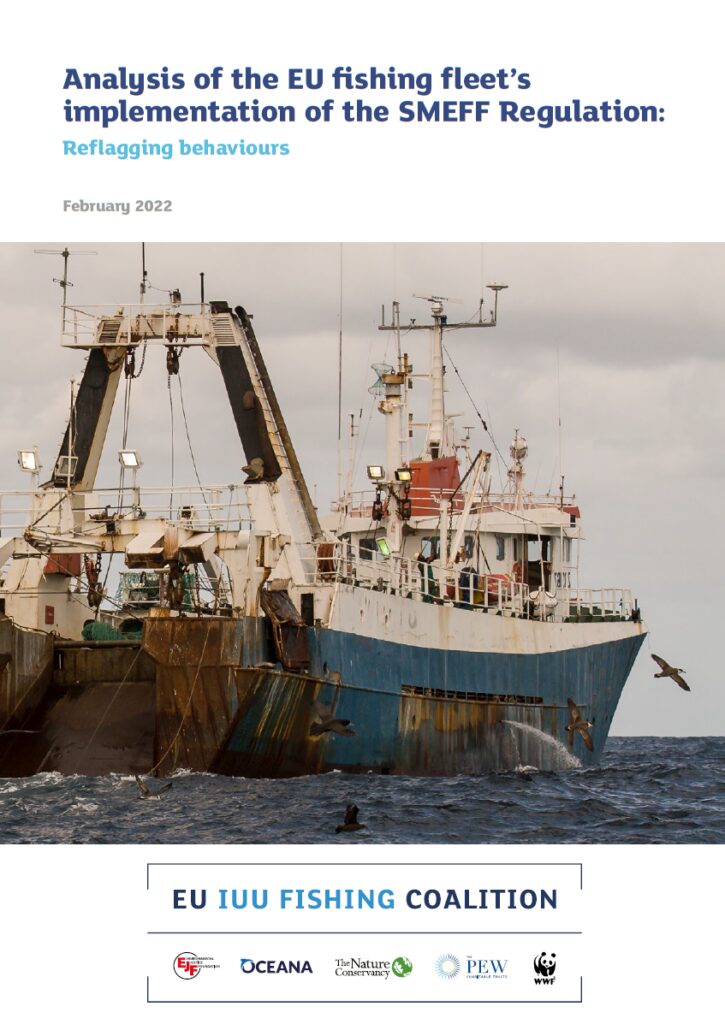Report | May 5, 2022
Analysis of the EU fishing fleet’s implementation of the SMEFF Regulation: Reflagging behaviours
In January 2018, the EU introduced a more stringent legal framework for the control of EU vessels fishing in non-EU waters, in the form of the EU Regulation on the sustainable management of external fishing fleets (SMEFF Regulation),1 which replaced and repealed the Fishing Authorisation Regulation (FAR).2 The new regulation addressed loopholes in transparency and sustainability, and required the EU to create a public database of fisheries authorisations. It was also seen as an effort by the EU to better implement its responsibilities as a party to the Food and Agriculture Organization (FAO)’s Compliance Agreement.3 Furthermore, a novel element of the new regulation was that private or direct authorisations should meet EU standards and adhere to EU laws on sustainability. Under FAR, EU vessels fishing under direct authorisations4 were not subject to the same EU standards that applied to other EU vessels fishing under Sustainable Fisheries Partnership Agreements (SFPAs)5 or, to an extent, in Regional Fisheries Management Organisations (RFMOs),6 even though these fishing activities had equal access to the EU market. In the preamble of the SMEFF Regulation, the EU recognised that its “IUU Regulation,7 FAR and Control Regulation8 were not implemented consistently; in particular there were inconsistencies between the FAR and the Control Regulation [while] the implementation of the FAR also revealed several loopholes, since some challenges in terms of control, such as chartering, reflagging and the issuance of fishing authorisations issued by a third-country [for an EU vessel to fish] outside the framework of an SFPA (‘direct authorisations’), were not covered.”9 Reflagging refers to the process of changing the flag of a vessel from one country to another. Although reflagging is perfectly legal, there are a number of instances where the rationale for choosing to reflag a vessel could be problematic, for example, when the owners of fishing vessels may try to get around the necessary authorisations or fishing quotas by reflagging their vessels. In September 2016, the EU IUU Fishing Coalition published an investigation on the reflagging behaviour of the EU fleet. It sought to identify patterns of reflagging behaviour and to highlight which flag States and companies consistently engaged in reflagging. The 2016 investigation identified 23 vessels that had entered or reentered the EU fleet register having previously operated under flags of non-EU countries found to be failing in their efforts to stop illegal, unreported and unregulated (IUU) fishing. These failings were indicated by EU decisions to red or yellow “card” these countries under the EU IUU Regulation10 (Box 1). Certain vessels were authorised to fish under official EU access agreements almost immediately after (re)joining the EU fleet, despite concerns as to the level of control exerted over them by their previous flag State.11 Such repeated and purposeful reflagging between carded non-EU countries and the EU fleet reflected behaviours contrary to the objectives of the Common Fisheries Policy (CFP)12 because effective scrutiny of vessels returning to the EU fleet from these countries was apparently lacking.


